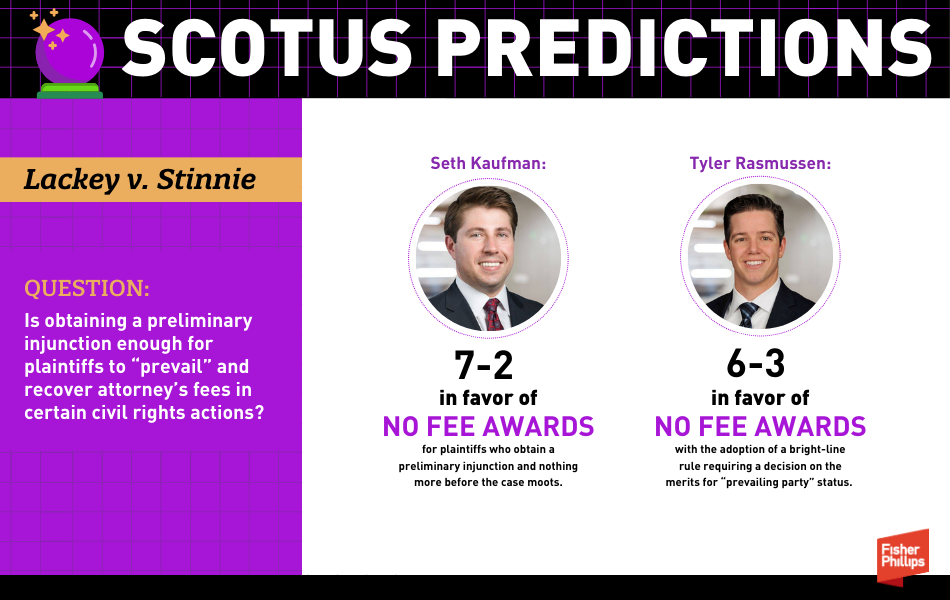FP SCOTUS Predictions: Supreme Court Will Make It Harder for Plaintiffs to Recover Attorney’s Fees in Civil Rights Actions and Beyond
Insights
11.12.24
The Supreme Court will soon decide whether obtaining a preliminary injunction is sufficient to qualify as a “prevailing party” in order to recover attorney’s fees in certain civil rights actions – and we predict the Court will rule that obtaining a preliminary injunction, without a final determination from the court, is insufficient. While Lackey v. Stinnie is not a workplace case, it could impact the ability of employers to recover fees in taking action to challenge a state regulation, or how courts view other workplace laws, like civil rights or wage and hour laws, that grant attorney’s fees to prevailing plaintiffs. While the Justices were somewhat divided at the oral argument held on October 8, we predict the Court will hold that the prevailing party standard at issue requires a final ruling of at least one claim on the merits, reversing the 4th Circuit, which held that a preliminary injunction was sufficient. Read on for an analysis of the issues and our specific predictions on how SCOTUS will decide the case.
What’s the Issue?
The Supreme Court will decide in Lackey v. Stinnie whether a likelihood of success on the merits – the standard used by courts when granting preliminary injunctions – creates “prevailing party” status (and therefore eligibility for fee awards) in certain civil rights actions. Federal appeals courts are divided over this issue, including the underlying appeals court (the 4th U.S. Circuit Court of Appeals) flip-flopping on the issue.
How Did We Get Here?
Factual Background
Damian Stinnie and other Virginia residents filed a class action lawsuit against the Commissioner of the Virginia Department of Motor Vehicles. The plaintiffs claimed that a Virginia law violated their due process rights because it required automatic suspensions of their driver’s licenses after they were unable to pay certain court fines and fees.
A federal district court issued a preliminary injunction reinstating their licenses, finding that they were likely to succeed on the merits of their claim. While the case was still pending, Virginia repealed the relevant law, and the case was dismissed as moot. The only remaining issue is whether the plaintiffs are “prevailing parties” and able to recover attorney’s fees.
Legal Background
Under 42 U.S.C. § 1988, courts may allow the “prevailing party” to recover attorney’s fees in certain civil rights actions. The 4th U.S. Circuit Court of Appeals established a bright-line rule in 2002 (Smyth ex Rel. Smyth v. Rivero) rejecting prevailing party status based solely on winning a preliminary injunction.
While the district court in Lackey applied that standard to deny prevailing party status to the plaintiffs, the 4th Circuit Court held that the plaintiffs “’prevailed’ in every sense needed to make them eligible for a few award.” In so holding, the appeals court overruled Smyth and established a new standard: “When a preliminary injunction provides the plaintiff concrete, irreversible relief on the merits of her claim and becomes moot before final judgment because no further court-ordered assistance proves necessary, the subsequent mootness of the case does not preclude an award of attorney's fees.” The Virginia officials appealed to the Supreme Court.
How Did the SCOTUS Oral Arguments Go?
While the plaintiffs argued that “the winner of an unrepudiated preliminary injunction can qualify as a prevailing party” under Section 1988, Virginia argued that the prevailing party standard requires:
- a final, favorable judgment, or at least a ruling on the merits; and
- “enduring” relief that comes from the court, rather than a non-judicial act that moots the case.
The Court expressed concerns over both parties’ positions. Certain Justices questioned the government’s push for a categorical rule against fee awards for winning a preliminary injunction even though the plaintiffs had obtained all the relief they sought from the court at the time the case was mooted by the state. Other Justices pressed the plaintiffs as to whether permitting prevailing party status without a final judgment on the merits would create a slippery slope where it would be difficult to draw the line after certain interlocutory wins by a plaintiff.
How Could This Impact Workplace Law?
Although Lackey v. Stinnie is not a workplace case, the outcome could impact employment litigation – particularly in race and ethnicity discrimination claims under 42 U.S.C. Section 1981. If the Court rules in favor of the plaintiffs, we could see a significant increase in parties seeking preliminary injunctions and using the potential fee award as a sword in both pre-litigation discussions as well as during the litigation process.
Further, a potential increase in regulation at the state level in light of the Court’s recent decision that stripped power from federal agencies could lead to more employers and employees challenging rules issued by state agencies and seeking preliminary injunctions to block those rules from taking effect. Because Lackey could limit or expand when attorney’s fees may be awarded, the decision could greatly affect both the motivations and willingness of parties to proceed with that litigation.
In addition, this decision could affect how courts view preliminary orders in other contexts where fees could be awarded. For example, under the standard advocated by plaintiffs, successful collective action certification under the Fair Labor Standards Act or class certification under Rule 23 in wage and hour lawsuits could arguably constitute a “material alteration of the legal relationship between the parties” resulting in plaintiffs seeking fee awards for winning on these preliminary issues prior to any final determination on the merits of any substantive claim.
FP SCOTUS Prediction: Supreme Court Will Require a Decision on the Merits to “Prevail”
Both of our authors believe that the Court will make it harder for workers and other plaintiffs to collect attorney’s fees by ruling that a party is not eligible as a “prevailing party” simply by winning a preliminary injunction and nothing more before the case moots.
- Seth Kaufman: A 7-2 decision in favor of the government, ruling that a party winning a preliminary injunction and nothing more cannot constitute a “prevailing party” eligible to obtain fees. The vast majority of Justices (all excluding Justices Jackson and Sotomayor) seemed far too skeptical that a prevailing party could be determined prior to finality of at least one claim on the merits. Several Justices pointed out that while a party that obtains a preliminary injunction is “successful,” the party did not go into court simply to obtain that temporary relief and nothing more. And the Justices acknowledged the problems with applying an abstract test governing at what point in the litigation a party can be considered to have “prevailed.”
- Tyler Rasmussen: A 6-3 decision adopting a bright-line rule that a prevailing party is only decided when there is a decision on the merits. To hold otherwise opens the door too much to interpretation, especially when the time to issue a preliminary is usually on an expedited process with looser evidentiary rules and standards for adjudication. However, to hedge my bets, if the Court were to find the preliminary injunction to be sufficient grounds for awarding attorney fees, I predict that the ruling will be very limited – almost to this specific fact pattern – so that a party who wins a preliminary injunction may “prevail” only if the other side takes actions to withdraw their defense and render the case moot (such as when the government in Lackey delayed a final judgment so that lawmakers could repeal the contested law and moot the case).
Conclusion
We expect the court to issue an opinion sometime during the next few months. We will continue to monitor developments related to this case and provide an update when SCOTUS issues an opinion, so make sure you subscribe to Fisher Phillips’ Insight System to get the most up-to-date information. If you have questions, contact your Fisher Phillips attorney or the authors of this Insight.
Related People
-
- Seth D. Kaufman
- Partner
-
- Tyler T. Rasmussen
- Partner


